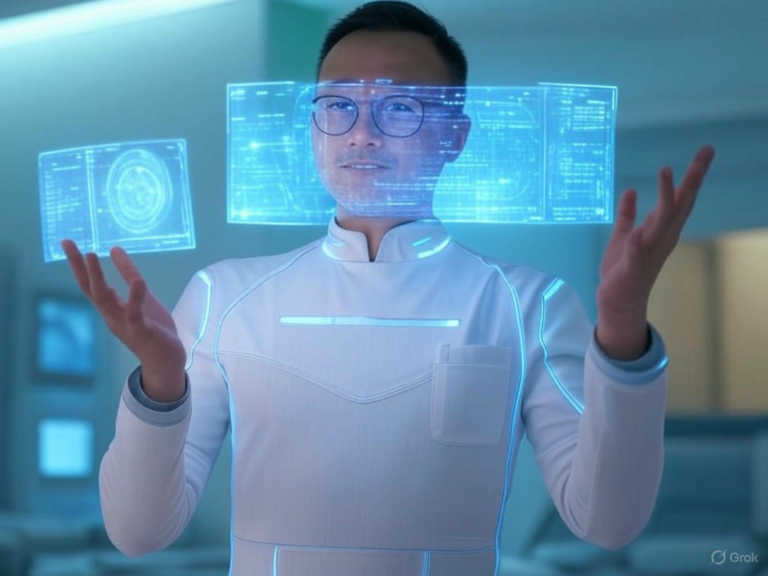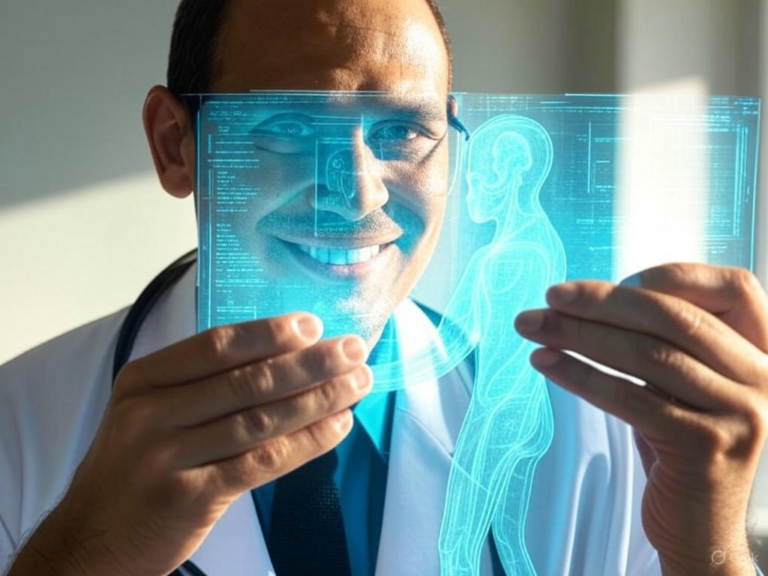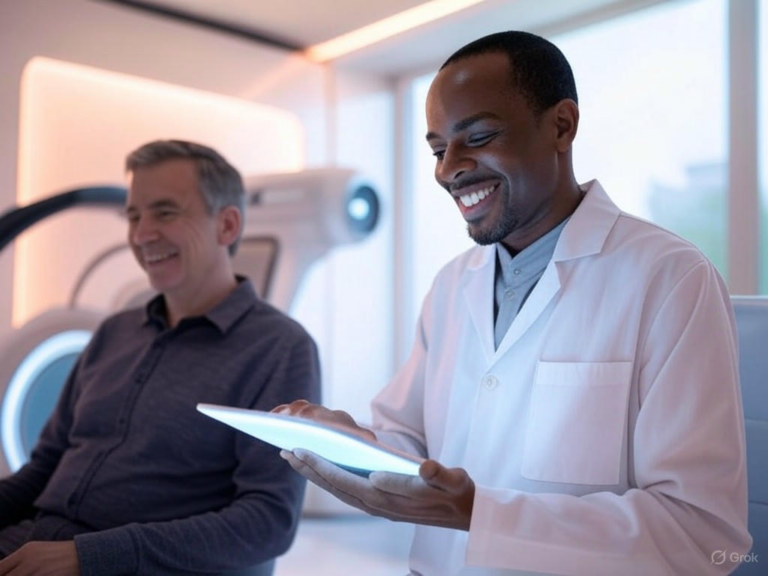
AI Innovations in Medicine: Nobel Laureate Predicts Disease Cures Soon
AI in Medicine: Pioneering the Next Wave of Healthcare
AI in medicine is reshaping how we approach health and disease, with cutting-edge tools accelerating discoveries that could lead to faster cures. Just imagine a world where AI systems not only predict protein structures but also offer second opinions that rival top specialists. This rapid evolution, highlighted by recent Nobel Prize awards, is setting the stage for AI to potentially outperform human doctors in clinical decisions within the next decade.
Experts like AI pioneer Geoff Hinton envision AI in medicine evolving into digital doctors that handle everything from diagnostics to personalized treatments. As we dive deeper, it’s clear that these advancements aren’t just futuristic dreams—they’re happening now, driven by powerful algorithms and vast data sets. What if AI could catch diseases before symptoms even appear?
Nobel Prize Accolades for AI in Medical Breakthroughs
The 2024 Nobel Prize in Chemistry spotlighted AI’s role in solving long-standing biological mysteries, particularly in protein structure prediction. This recognition underscores how AI in medicine is no longer a supporting player but a lead innovator in scientific progress. For the first time, a Nobel was awarded for an AI-driven achievement, signaling a shift toward more collaborative human-machine discoveries.
At the heart of this is Alphabet’s AlphaFold, developed by Demis Hassabis and John Jumper at DeepMind. This tool has revolutionized AI in medicine by predicting protein structures with remarkable accuracy, based solely on amino acid sequences. In just a few years, it has generated over 200 million protein structures, compared to only about 200,000 known in 2020—a leap that could accelerate drug development for everything from cancer to rare diseases.
Sharing the prize is David Baker from the University of Washington, whose work on computational protein design complements AlphaFold’s capabilities. Baker’s Rosetta algorithm allows for the creation of entirely new proteins, opening doors to custom therapies. Think about it: proteins designed from scratch could target specific diseases with precision, making treatments more effective and less invasive.
Geoff Hinton’s Vision for AI’s Medical Revolution
Often called the “Godfather of AI,” Geoff Hinton has been instrumental in advancing neural networks that power today’s AI in medicine. In a 2023 discussion with health expert Eric Topol, Hinton predicted that within 10 to 15 years, AI systems will routinely provide second opinions and might even excel in certain clinical decisions. His optimism stems from AI’s ability to process vast amounts of data far beyond human limits.
Hinton’s key contributions include inventing backpropagation, a foundational algorithm for training AI models, and breakthroughs in deep learning that enable machines to detect patterns in medical images or patient data. These innovations are already enhancing AI in medicine, from improving diagnostic accuracy to supporting personalized medicine plans. Have you ever wondered how AI could help catch errors in a doctor’s diagnosis?
- Backpropagation: A technique that trains neural networks efficiently, now essential for AI applications in healthcare.
- Deep learning advancements: Allowing AI to analyze complex data, like scans or genetic information, with human-like intuition.
- Real-world impact: Transforming fields like oncology, where AI in medicine can spot early signs of tumors that might be missed otherwise.
Transforming Medical Research with AI Innovations
AI in medicine is making waves in research and drug discovery, particularly through protein sequencing. By predicting how proteins fold and function, AI tools are speeding up the development of new treatments, potentially curing diseases that have stumped scientists for years. This efficiency could cut years off traditional research timelines, offering hope for patients waiting for breakthroughs.
AlphaFold’s Game-Changing Role in Discovery
AlphaFold has mapped nearly every known protein, giving researchers a powerful ally in AI in medicine. This capability allows for more precise drug targeting, which means therapies can be designed to attack diseases at their molecular roots. For example, in cancer research, AlphaFold’s insights could lead to drugs that minimize side effects while maximizing effectiveness.
Scientists are already using these predictions to explore new frontiers, like viral proteins, which could revolutionize vaccine development. Isn’t it exciting to think about how AI in medicine might have shortened the path to COVID-19 vaccines?
Creating Custom Proteins for Health Solutions
Building on this, David Baker’s work enables the design of novel proteins tailored for specific medical needs. These custom proteins could treat conditions by addressing issues at a cellular level, such as breaking down pollutants or targeting tumor cells. In practice, his team’s innovations have led to proteins that clean up environmental toxins, with direct applications in AI in medicine for drug-resistant infections.
One relatable example: Imagine proteins engineered to neutralize harmful bacteria in the body, offering a new way to combat superbugs. This approach not only enhances treatment options but also paves the way for sustainable medical advancements.
AI’s Success in Antibiotic Development
A standout achievement is the discovery of Halicin, the first AI-identified antibiotic. Developed by MIT’s Jameel Clinic, AI scanned millions of compounds in record time, identifying Halicin as a potential fighter against drug-resistant bacteria. This demonstrates how AI in medicine can accelerate processes that once took decades down to months.
As a result, we’re seeing faster responses to global health threats, like antimicrobial resistance. If you’re interested in how technology is fighting back against evolving pathogens, this is a prime example of AI’s potential.
The Rise of Digital Doctors in AI-Driven Healthcare
Looking ahead, AI in medicine promises truly personalized care, using patient data to tailor treatments like never before. Large language models could analyze your medical history and suggest options that fit your unique needs, making healthcare more proactive and precise. Hinton believes these systems will soon act as reliable partners to doctors, enhancing decision-making with data-driven insights.
AI as Your Trusted Second Opinion
In the coming years, AI in medicine will likely become a standard for providing second opinions, reviewing cases with the latest research and patterns. This could mean catching overlooked details in a diagnosis, giving patients more confidence in their care. For instance, if a doctor suggests a treatment, an AI could cross-reference it with global data to confirm or suggest alternatives.
Wouldn’t it be reassuring to have an AI double-check important health decisions? This integration could reduce errors and improve outcomes across the board.
Personalized Health Guidance from AI Advisors
Emerging AI advisors might monitor your daily health, offering tips on everything from diet to exercise based on real-time data. These tools could predict risks for conditions like diabetes or heart disease, helping you make preventive changes. In AI in medicine, this shift toward proactive care is about empowering individuals to take control of their well-being.
A simple scenario: Your AI detects early signs of stress and recommends breathing exercises or lifestyle tweaks—small steps that could prevent bigger issues.
AI’s Edge in Clinical Choices
Beyond basic support, Hinton argues that advanced AI models could outperform humans in specific diagnostic tasks, thanks to their ability to process vast datasets. While some skeptics worry about over-reliance, the evidence from ongoing trials shows AI’s potential to enhance, not replace, human expertise. As AI in medicine evolves, it might even lead to cures for complex diseases like Alzheimer’s.
One tip: Stay informed about these developments by exploring AI-powered health apps, which can offer personalized insights right from your phone.
Navigating Ethics and Regulations in AI for Healthcare
With AI in medicine advancing so quickly, ethical concerns are rising, from data privacy to biased algorithms. Regulators must balance innovation with safety, ensuring these tools benefit everyone without amplifying inequalities. It’s a delicate dance, but getting it right could mean safer, more equitable healthcare for all.
Hinton himself has voiced worries about AI’s broader risks, yet he sees a positive path where it acts as a helpful guide for humanity. For example, strong regulations could prevent misuse while allowing AI to tackle global challenges like pandemics.
Protecting Innovations: Intellectual Property in AI Medicine
As companies invest in AI for drug discovery, protecting intellectual property becomes crucial. This includes safeguarding AI platforms and the novel products they generate, like custom proteins or new antibiotics. In the realm of AI in medicine, clear IP frameworks will encourage investment and innovation, ensuring creators can benefit from their work.
Consider how patents for tools like AlphaFold could spur more collaborative efforts, driving forward the field while rewarding pioneers.
Shifting Paradigms in Scientific Progress with AI
The 2024 Nobel Prize has ignited discussions on how AI in medicine is changing the essence of discovery. Traditionally, science relied on human ingenuity, but now AI is accelerating processes, making breakthroughs more accessible. This evolution raises questions about collaboration between humans and machines in research.
For instance, AI could analyze years of data in hours, uncovering patterns that lead to unexpected cures. It’s a reminder that AI in medicine isn’t just about technology—it’s about amplifying our collective potential.
Wrapping Up: Embracing a Digital Health Future
AI in medicine is on the cusp of transforming healthcare, promising cures for diseases that have long eluded us. From Nobel-winning protein predictions to Hinton’s forecasts of digital doctors, we’re entering an era where AI could make personalized, effective treatments the norm. As these technologies mature, they might even redefine how we view human biology and wellness.
What’s your take on AI’s role in medicine—could it be the key to better health for everyone? I’d love to hear your thoughts in the comments, share this post if it sparked your interest, or check out our other articles on emerging tech for more insights.
References
1. “Nobel Prize for AI: Digital Doctors to Be Expected in 10-15 Years.” ICT Health. Link.
2. “AI Medical Revolution.” Kiplinger. Link.
3. “Nobel Prize Celebrates AI’s Role in Protein Structure Innovation.” Drug Target Review. Link.
4. “Nobel Laureates in AI and Protein Folding.” Bench International. Link.
5. “AI and the 2024 Nobel Prizes.” Nordic Life Science. Link.
6. Interview with Geoff Hinton (2023). YouTube. Link.
7. “Nobel Prize 2024: AI Contributions Are Making a Difference.” Ultralytics. Link.
8. “AI in Life Sciences.” Prose Media. Link.
AI in medicine, Nobel Prize for AI, digital doctors, AlphaFold, protein structure prediction, personalized medicine, AI drug discovery, healthcare AI, Geoff Hinton AI, medical revolution







